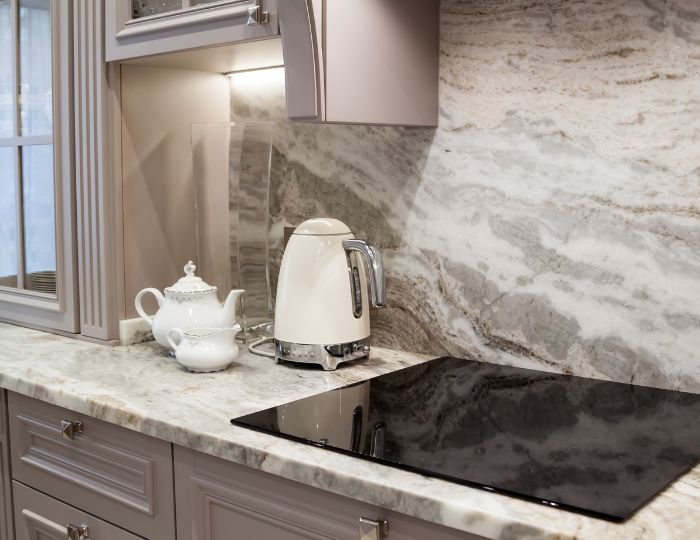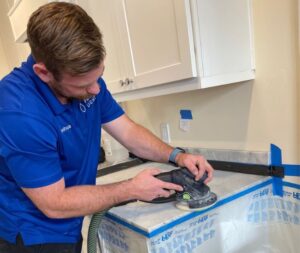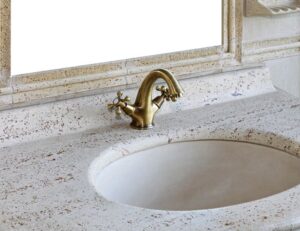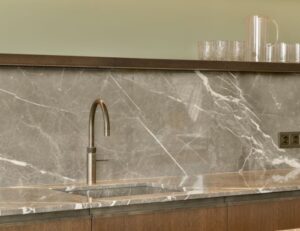Natural stone brings unmatched elegance, durability, and timeless appeal to kitchens, bathrooms, floors, and outdoor living spaces. However, one of the most common questions homeowners ask is whether sealing is truly necessary. While stone is strong, it is not impervious to everyday wear and tear. Sealing plays a key role in preserving the beauty and longevity of your stone surfaces.
In this blog, we’ll break down why sealing matters, how it protects different types of stone, and when professional sealing and restoration may be the best choice.
Why Stone Surfaces Need Protection
Stone might feel indestructible, but many types are naturally porous. Marble, limestone, and travertine are especially prone to absorbing liquids, while granite and quartzite, though denser, can still stain under the right conditions. Everyday spills like wine, coffee, or cooking oils can penetrate the surface and leave lasting discoloration.
Sealing creates an invisible barrier on the surface, helping resist stains, repel moisture, and reduce etching. Without that protective layer, your stone is left vulnerable to damage that can be difficult—or even impossible—to reverse without professional help.
The Benefits of Sealing Stone Surfaces
Sealing isn’t just about stain prevention—it’s about protecting your investment. Some of the key benefits include:
-
Stain Resistance: Sealants make it harder for liquids to seep into the stone, giving you more time to clean up spills.
-
Easier Maintenance: Sealed surfaces are smoother, making routine cleaning less of a chore.
-
Enhanced Longevity: Regular sealing minimizes wear and tear, preserving both appearance and structural integrity.
-
Protection Against Etching: For softer stones like marble, sealing can help minimize the effects of acidic foods and cleaners.
When you think about the cost of restoring or replacing stone, sealing is a simple step that offers long-term savings.
Do All Stone Surfaces Require Sealing?
Not every stone has the same needs. Granite, for example, may not require sealing as frequently as marble. Outdoor stone may need more regular attention due to exposure to weather, UV rays, and moisture. Polished stone generally absorbs less than honed or textured finishes, which means sealing requirements can vary even within the same material.
The best way to know if your stone needs sealing is to perform a simple water test: place a few drops of water on the surface and wait. If the water begins to darken the stone within a few minutes, it’s time for a fresh seal.
Professional Sealing vs. DIY Products
While there are DIY sealing products available, professional sealing offers longer-lasting protection and better results. Store-bought sealants may provide short-term defense, but they often wear down quickly. A professional restoration company uses high-quality sealers designed for your specific stone type and finish, ensuring deeper penetration and longer durability.
Additionally, professionals can assess whether your stone needs deep cleaning or even light restoration before sealing. Applying a sealer over a dirty or damaged surface only locks in imperfections. A thorough restoration process brings out the stone’s natural beauty before sealing it for long-term protection.
How Often Should You Seal Your Stone?
The frequency of sealing depends on the type of stone, the finish, and the location. High-traffic surfaces like kitchen countertops and floors may require sealing every 1–2 years, while less-used surfaces may last longer between applications. Outdoor stone often requires more frequent care due to weather exposure.
Think of sealing as routine maintenance—similar to servicing your car or changing your HVAC filters. With regular upkeep, you’ll extend the life of your stone and keep it looking like new.
Protect Your Stone with Expert Care
Sealing is not just an optional extra—it’s an essential part of caring for your stone surfaces. Whether you have marble countertops, granite floors, or a stone shower, sealing helps preserve their beauty, prevent costly damage, and make daily upkeep easier.
If your stone is showing signs of staining, etching, or dullness, don’t wait until the problem gets worse. Professional stone restoration and sealing can revive its appearance and give it lasting protection. Contact our expert team today to schedule your stone sealing or restoration service. Keep your stone surfaces beautiful and protected for years to come!












